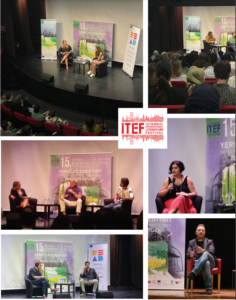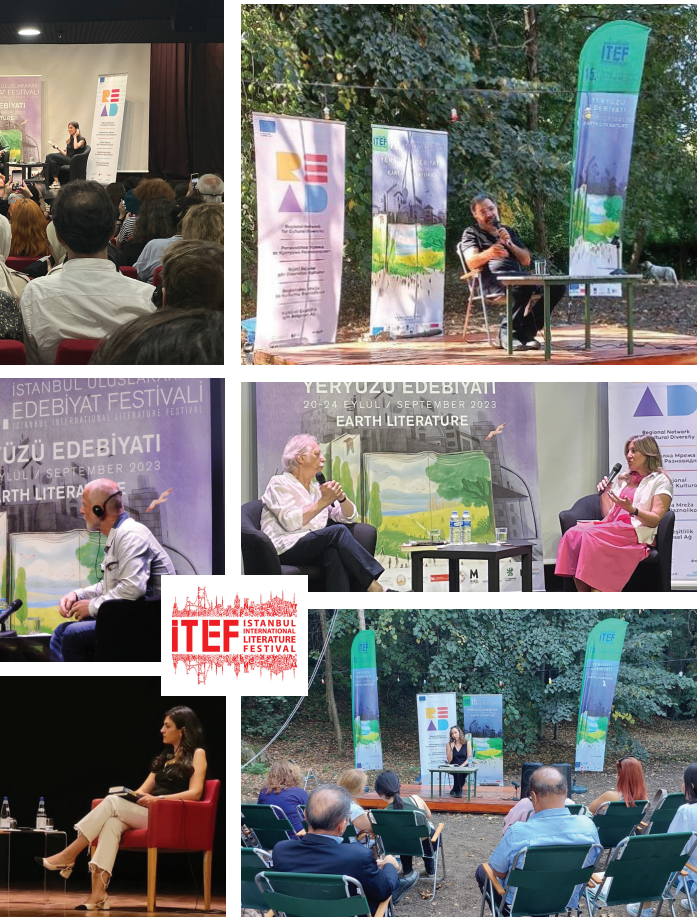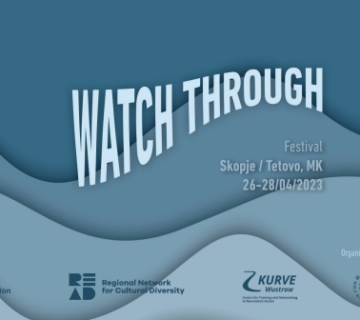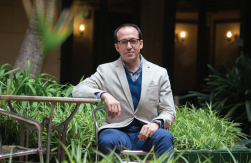Aleksandra Savanovic was in residency in Istanbul
for one month during the Autumn 2023,
hosted by Kalem Culture Association.

I am awake, nevertheless. The coffee tastes the same, and under the hot shower the body
relaxes in spite of itself. I have obligations! I ride like a phantom across the concrete prairie.
Around me, Belgrade breathes and multiplies at every step. It could be said: a big city. But
where are all these people otherwise, where are all these dimensions, the hidden worlds
eluding grasp?
World no. 1: At the bus stop. There aren’t many people in the streets, it’s mostly buildings and
an occasional object: petrol stations, cars and furniture showrooms, billboards, the omni-
present containers with trash. Among them a car holds the place of honor, some sort of prize
or simple advertising, it’s making a show of itself on a pedestal, at the intersection of
Omladinskih Brigada and Jurija Gagarina, red, a reminder instead of a monument, always
well-polished, it is a placeholder. But the Chinese are awake. Already busy and in haste,
rolling by in their vans and buzzing around the shopping centre which is stirring to life and is
just about to stand up, slowly straightening on its four stunted, scrawny legs, in its natural
modernist habitat, surrounded by massive swaths of concrete, frozen soil, muddy grass and
broad paths intended for road vehicles, or for something much larger, this gigantic green-blue
armoured beetle, which now stands entirely stable, like an intergalactic AT-AT, it shakes off
multicoloured beads, plaid tote bags, while people step out of their freshly opened shops,
crowding the building façades, joyously clapping their hands and waving cheerfully. The
mobile shopping centre, Kowloon, a walled city, tiptoes away, step by step, somewhere
towards Bežanija. Right behind its back left leg, the articulated #95 bus, finally swings into
view.
(Jurija Gagarina – Antifašističke borbe – Milutina Milankovića – Milentija Popovića –
Mihajla Pupina)
World no. 2: Branko’s Bridge. Congestion at the bridges, those narrow bottlenecks of the city.
We inch along, the view opens out before us, the vastness from all sides squeezes our yellow
tin cane more harshly, more brutally, I breathe a little, modestly claustrophobic, I suck in
what's left of the air, a panic attack anticipated as I imagine its abundance… outside… with a
view of Belgrade Waterfront, it slices the horizon, sparkles for the poor, actually against
them, each day all the higher, more grotesque, less needed. Time flows by in bits, or
overflows, waves with a regular and irregular beat, three eight time or as needed, today, for
tomorrow, one hundred fifty hours all at once, or fifteen per day, out of necessity, just once
more, for those who are moving, who are fed by no one, for those who are late, those who
collide, who push one another away or are pushed away, who faint or cling heroically to that
speck of smelly oxygen, eagerly awaiting the next opening of the door, heads raised above
the crowd, noses stuck up not out of arrogance but out of need, on the bus, planted in the
seats, with grabrail in hands, motionless, like gymnasts, acrobats, but with no skill to defy the
pull of gravity, or, merely, to defy. Planted. Correctly. Like sardines. Among windows fogged
by breathing, by all the sighs, not amorous. Feet welded to the wheels, they bounce as they
meet the potholes, tram tracks, cracked and re-patched pavement, they jounce, stuck together,
tied by drawstrings, affixed by skins and hairs and the occasional bobbypin that comes
undone, umbrellas dripping onto boots already caked with slush. Heads drop into laps, then
roll away.
World no. 3. Zeleni Venac. The pljeskavica burgers are on the grill, the smell of Macdonalds’
fries spreads, uphill, down the stairs, a line for bread rolls, through an underground
passageway still empty of beggars, cardboard stands vending socks, watches and belts, then
upstairs, the exchange office is (always) open, uphill, another bakery, a pastry shop, another
exchange office, convenience store, a crosswalk. Hotel Moscow, people trading album
stickers, I run for the trolley. Everybody’s asleep, I’m dreaming.
World no. 4: A Postcard from the Future. The traffic is not too busy so the trolley glides
elegantly towards Slavija roundabout, with the lavish musical fountain right at its center.
While we circled the fountain (the obligatory three times around, as required by the new
traffic law) it changed hues from blue to red and joyfully sang “Belgrade, Belgrade, we all
love your singing streets…”. The trolley was honking, like all the other vehicles, while the
people in them (including me) sang along, swaying our heads back and forth (all of which
was required), around, around we inched performatively. On all sides of the roundabout
people in clusters gawked at the fountain, enchanted, or—cell phones held high—filmed this
spectacular attraction: harmony within and chaos all around it, the authentic Slavija
experience. Others waited in line at the control panel that manages and guides the fountain’s
water jets, impatient to become, themselves, its more or less talented conductors.
(…)
When a jet of water shot sixteen meters skyward, dozens of overjoyed observers, tourists, and
Belgraders took selfies next to this grandiose symbol of the city. Meanwhile I went on
singing “As if the time stands still for yooooou,” while traversing through the window of the
trolley, where I’d been sitting, to a nearby tram that was running along in parallel, the way
they do in action movies, but as if in slow motion. This performance, switching transportation
midstride without waiting, was, of course, yet one more of the famous Slavija attractions,
which I finally lost the sight of once the tram I transferred to, began moving up Beogradska
street.
World no. 5: Along the Boulevard toward Vuk and farther along to Đeram and Lion.
Nameless trees along the city's avenue slice into the sky. Preventively castrated decorative
plantings, reduced to their desirable size; height and width and depth, and all other
dimensions, such as—time, stand still, motionless, for the trees will never reach their full
height. For tree rings are not years, no sirree, what do you mean dendrochronology, forest
anthropology, stop. Ready set go, for those who try to catch up, who hurry along into yet
another pledged day, from the morning on, in a fog, the pace drops as the concentration of
those who are pacing increases, the number of thoughts per square meter, the number of
screws, the tension thick like fresh-cooked rubber, silence tiptoes out stealthily, the breaking
of the sound barrier or mere noise, rush hour will start soon. The distracted light has squeezed
itself into the dark circles under eyes of the man behind the wheel. Crimson-purple. A strip in
the windows, red like the map of capillaries on his nose and cheeks, traces of sleepless nights:
a surfeit of alcohol, sugar and caffeine, some say, simply, a rotten gene. The rhythm
commanded by the miniature gearshift of the gigantic city monster—the red snake. The hour
ticks by, the light is now translucent, the day dawns, it hesitates but yet it comes, always
evenly, always untimely, the streets fill with hands and feet and mouths, propulsion on all
fours, internal combustion of stomachs and motors, a row of muscles and a row of chassis.



